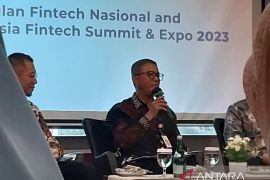Fintech companies that target retails and micro transactions in a number of provinces in Indonesia will expand people`s reach to have financial access.
Aidil Zulkifli, the CEO and Co-founder of UangTeman, a fintech company, said in a statement received by Antara here on Wednesday that people nowadays are beginning to utilize fintech services to meet their business needs.
"As one of the fintech companies, UangTeman continues to be committed to supporting the government in its efforts to enhance financial inclusion in Indonesia. This commitment is showed in a socialization program that we continue to carry out."
"Last week, for instance, we held some socialization programs in five cities in Indonesia, collaborated with an online motorbikes transportation company," Zulkifli noted.
He said that through socialization and close attachment with people, fintech services, especially peer-to-peer (P2P) lending can be properly used, thus bringing about a positive influence on customers and contributing to the national economy.
The Financial Services Authority (OJK) has up to July 2018 recorded a total distribution of fintech loans worth Rp9.21 trillion (about US$606 million), or an increase by 259.36 percent (ytd), with an NPL worth 1.4 percent.
The number of Fintech P2P Lending fund provider accounts was 135,025 entities, or an increase by 33.77 percent (ytd), while the number of borrower accounts was 1,430,357 entities, or an increase by 450.91 percent (ytd).
As of Sept 4, 2018, the number of Fintech P2P Lending companies which registered in OJK was 67.
Meanwhile, there were 40 companies in the registration process and 38 companies that were interested in registering at OJK.
The government, through OJK, expects financial inclusion in 2019 to reach 75 percent, or an increase by 69 percent from that in 2017.
Based on the 2017 National Financial Inclusion Strategy (SNKI) Revisit, the public financial literacy index showed that only 13 of 34 provinces have a financial literacy index above the national average.
This condition reflects the uneven public knowledge about finance in all provinces.
Such dissimilarity is also seen in the amount of fintech loans as of July 2018, valued at Rp9.21 trillion, which is dominated by people in Java at Rp8.1 trillion. Meanwhile, the remaining fund of Rp1.11 trillion was used by those outside Java.
Chairman of Aftech`s Cash Loan P2P, Sunu Widyatmoko, remarked that the financial inclusion target of 75 percent in 2019 is an opportunity for fintech businesses to contribute to the national program.
According to him, the performance of Fintech P2P Lending can make the financial inclusion target set by the government more possible to materialize in 2019.
"Fintech, especially P2P Lending Cash Loan, is aimed at facilitating prospective customers to access financial services, especially for those who have difficulty obtaining capital or lack of access to banks," Widyatmoko revealed.
He is optimistic Fintech P2P Lending can contribute to achieve the financial inclusion target of 75 percent in 2019.
"We are optimistic that the 75 percent target will be achieved. So far our performance has been good. People increasingly trust fintech. We do not find obstacles in terms of regulation, administration, or other things," he pointed out.
Reporting by Joko Susilo
Editing by Libertina W Ambari
Reporter: Antara
Editor: Yosep Hariyadi
Copyright © ANTARA 2018












